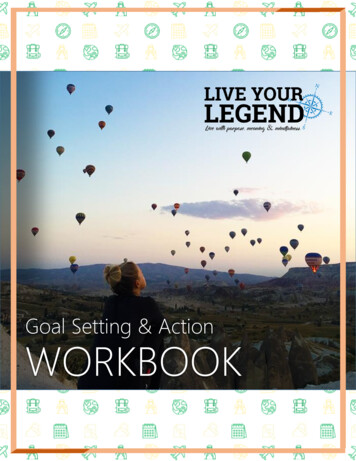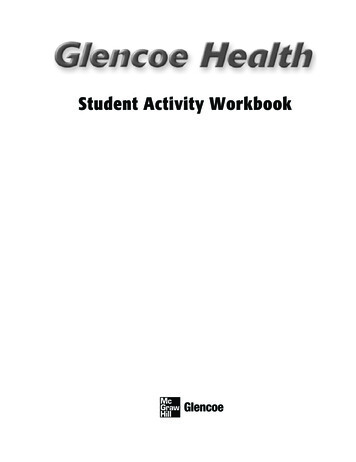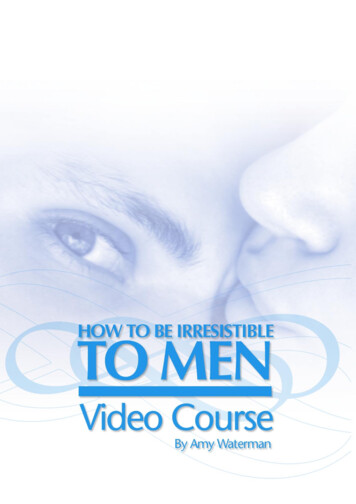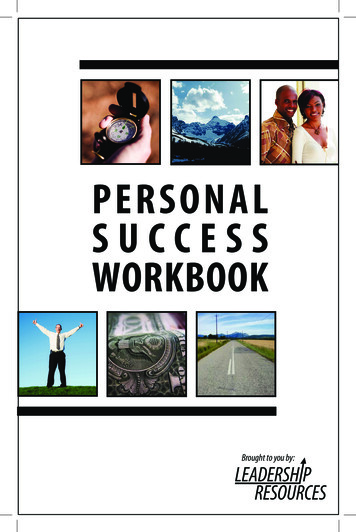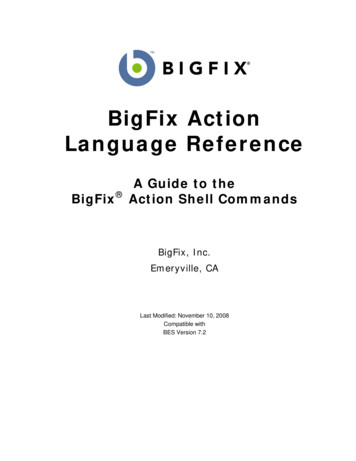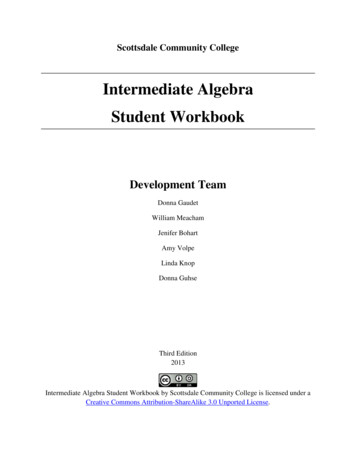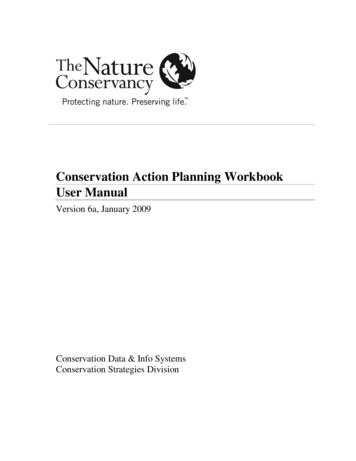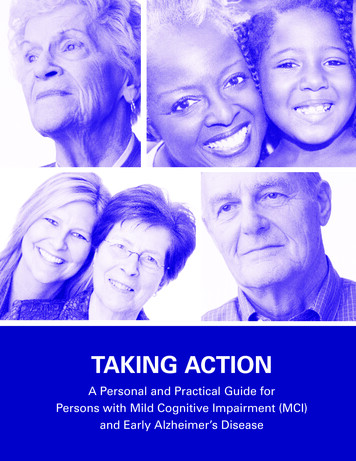
Transcription
TAKING ACTIONA Personal and Practical Guide forPersons with Mild Cognitive Impairment (MCI)and Early Alzheimer’s Disease
Table of ContentsAcknowledgementsForewordIntroduction[ 1 ] Understanding Memory Loss. 1[ 2 ] Partnering With Your Doctor. 6[ 3 ] Telling Others About the Diagnosis . . 10[ 4 ] Caring For Our Most Precious Relationships: . . 14Family and Friends[ 5 ] Daily Strategies For Living With Memory Loss . 18[ 6 ] Coping With Changes . 22[ 7 ] Effective Communication . 26[ 8 ] Making Decisions . 30[ 9 ] Legal & Financial Issues . . 34[ 10 ] Playing It Safe . 38[ 11 ] Opportunities for Supporting Research. 42[ 12 ] Resources for People with MCI and . . 46Early Alzheimer’s DiseaseMedication Log. 47Appointment Log . 48Notes . 49
AcknowledgementsThe Minnesota-North Dakota Chapter would like to thank the followingorganizations and foundations to help create this workbook:We would like to thank the Alzheimer’s Association Colorado Chapter and BookProject Coordinators: Cindy Baurer, LCSW, former Family Options Coordinatorand Marcia Reish, BSN, Early Stage Services Coordinator for creating thisunique book designed to educate, inspire and support individuals living with MildCognitive Impairment or early Alzheimer’s disease.In addition we would like to thank Michelle Barclay, David Goldberg, andAngela Lunde of the Minnesota – North Dakota Chapter for their contributions.The photographs used in this workbook are people in our community who areimpacted by Alzheimer’s disease or a related dementia. We thank them for theircourage and for being the VOICE of Alzheimer’s.We would also like to thank the following for their generous support:Allianz Life Insurance Company of North AmericaPark Nicollet Foundation Healthy CommunityStevens Square FoundationThis workbook was supported, in part, by The GHR Foundation, by grant number333-09-ALZH-005 from the Administration on Aging, Department of Healthand Human Services, Washington D.C. 20201 and the Minnesota Board onAging, St. Paul, MN 55155. Grantees undertaking projects under governmentAdministration on Aging or Minnesota Board on Aging policy.
ForewordThose of you reading this Taking Action workbookhave probably been told you have early Alzheimer’sdisease or a similar dementia. My name is Mike, andI’ve been in your shoes. Nearly three years ago I wasdiagnosed with Alzheimer’s disease. I was shocked andvery upset. Why Me? This can’t be true! After giving itsome time to set in I started accepting it. I told myself:“Ok, I have it. I’d rather not have it. I’m not going tochange it. So what am I going to do about it?”I knew I was finding an answer when a fellow ata meeting said, “The worst thing that could everhappen to me would be to have Alzheimer’s!” Isurprised myself saying before everyone, “It’s not sobad once you have it. I do, and I’ve found there is lifeafter Alzheimer’s.”Not long after I started accepting it I found some relief.Knowing I have Alzheimer’s made it okay to simplywork around everything that wasn’t operating right. Mylife became easier doing this. I found a new patience.Working with my limits put me into a different way oflife. All I could do is concentrate on making the best ofit. This is the key to tolerating your new way.They tell us, “Eat right, exercise daily and use yourthinking skills often.” This is the best way to staywhere you are right now. I truly believe this works.What works even better is your attitude. I decidedearly on: “If I gotta have this horrible disease, I wantto make having it worth it!” I find I can by remainingin contact with folks, finding new friendships amongthose with the same disease I have, and getting activeabout sharing my experiences living with Alzheimer’s.[Now I feel like I am making more of a contributionthen when I was floundering about trying to figureout, “What’s wrong with me?” I have gained a fargreater sense of worth and fulfillment. With activityin Alzheimer’s circles, I have learned there are lots ofpeople out there working with their disease. One ofthe support groups was studied and it was found thatfolks participating in it were staying in their early stagelonger because of the social, cognitive and creativeactivity with which they were involved in the group.I firmly believe that the sooner we learn we have thedisease, the better off we are. Knowing helps us getmedicine to slow the deterioration. It gets us out ofthe isolation that seems to happen with this doggonedisease. We can concentrate on doing what worksfor us. We also get the benefit of getting involvedwith other people and creative involvement making adifference.Really, how better can it get? We can’t go back. Wecan gain so much going forward. You’ve taken thefirst steps by getting in contact with the Alzheimer’sAssociation. I encourage you to learn all you canabout the disease, get active, and start living yourbest life with Alzheimer’s today.Sincerely,Mike DonohueLiving with Alzheimer’s diseaseKnowing helps us.get out of the isolation thatseems to happen with this doggone disease.Mike Donohue[
IntroductionMost of us who receive a diagnosis thatgreatly impacts our health and well beingdo not want to stand idly by and see whathappens. Instead, we want to take action.When we know we are engaging inactivities and doing things that can improveour situation, we naturally feel betterand we are empowered. This workbookis based on the belief that we cannot letlimitations interfere with what we still cando. Persons with early stage dementia cantake charge of their own health and takesteps to live their best.This workbook is designed to be used byindividuals living with Mild CognitiveImpairment (MCI) and early Alzheimer’sdisease or a related disorder. Think of it asa guide to help you in learning about thechanges you are facing and steps you cantake to help yourself.People learn in different ways - eitherby reading, writing or talking to others.You may find the workbook a useful wayto educate yourself and your family andfriends. It can be used as a way to beginconversations about changes you areexperiencing. Writing down importantideas and information is a helpful memoryaid. Written information can also be easilyshared with others. You may experiencenew and different feelings associated withthe diagnosis. This book may help you toidentify and share those feelings with whomean the most to you.This workbook can be used alone or withfamily members or friends. It is dividedinto 12 chapters that address commonconcerns and includes educationalinformation and perspectives of peopleliving with memory loss.Congratulations on making the decisionto Take Action!
[1]UnderstandingMemory LossAging, Memory Loss, Dementia,and Alzheimer’s Disease:What’s the Difference?Normal AgingDementiaWe all know that many things change aswe age. In normal aging, our bodies andbrains slow down, though intelligenceremains stable. We are less physically andmentally flexible, and we take more timeto process information. Memory changesoccur as well, and it’s common to havegreater difficulty remembering names ofpeople, places and other things as we age.Dementia is not a disease. It is a generalterm that describes a set of symptoms thatmay be caused by a number of differentbrain disorders. These symptoms involvemental decline severe enough to disruptdaily life that affect more than one of thefollowing core brain functions:Mild Cognitive Impairment (MCI) In MCI, a person has problems withmemory or another core brain function.These problems are severe enough tobe noticeable to other people and showup on tests of mental function, but notserious enough to interfere significantlywith daily life.People with MCI have an increased riskof developing Alzheimer’s disease in thenear future, especially when their mainsymptom involves memory. However,not everyone diagnosed with MCIprogresses to Alzheimer’s or another typeof dementia.www.alz.org/mnnd Recent memory — the ability tolearn and recall information.Language — the ability to write orspeak, or to understand written orspoken words. Visuospatial Function — the abilityto understand and use symbols, mapsand the ability to correctly judgewhere objects are. Executive Function — the ability toplan, reason, solve problems andfocus on a task.1
[What lies behind us and what lies before us aretiny matters compared to what lies within us.Ralph Waldo EmersonAlzheimer’s DiseaseAlzheimer’s disease is the most commoncause of dementia. It is a slow, progressiveillness that damages nerve cells in thebrain. Symptoms gradually get worse overtime as more brain cells are destroyed.Though people can have Alzheimer’s intheir 30s, 40s, and 50s, the disease is mostprevalent in people over age 65.The first problem many people withAlzheimer’s disease notice is forgetfulnesssevere enough to affect their work, hobbies,or social life. Other common symptomsinclude mood changes, difficulty multitasking, misplacing things, repeatingthings, confusion, trouble with organizingand expressing thoughts, and becomingdisoriented or lost in familiar places.Although there is currently no cure,treatments are available and are most effectivewhen the disease is identified early.Getting a diagnosis is the first step towardsunderstanding what’s causing yoursymptoms and taking action to fight thedisease. Treatment can only be startedwhen the disease has been identified. Acomplete medical evaluation includes: Physical Examination includes theevaluation of a person’s nutritionalstatus, blood pressure, and pulse. Medical History providesinformation about current mental orphysical conditions, prescription drugintake, and family health history.2[ Mental Status Evaluation assessesa person’s sense of time and place andhis or her ability to remember,understand, talk, and do simplecalculations. In early stages, screeningof mental status may not detectsymptoms. Neurological Examination teststhe nervous systems (brain and spinalcord) for evidence of other neurologicaldisorders. A magnetic resonanceimaging (MRI) study of the brain maybe used to search for other possiblecauses of dementia, (i.e. stroke). In theearly stages of Alzheimer’s, the resultsare often “normal” or “unremarkable.” Laboratory Tests, such as blood andurine tests, provide additionalinformation about problems otherthan Alzheimer’s that may be causingdementia. Neuropsychological Evaluationtests memory, reasoning, vision-motorcoordination, and language function.This evaluation may provide the onlyevidence of dementia, especially in theearly stages. Psychiatric Evaluation provides anassessment of mood and otheremotional factors that could mimicdementia or that may accompanyAlzheimer’s disease.1.800.272.3900
Aging, Memory Loss, Dementia,and Alzheimer’s diseaseSome people withmemory loss say “Getting a diagnosis can be a relief.It helps explain why I feel this way andwhy things are harder to do. I accept itand live with it ”“I’m not the same as I was sincediagnosis. It’s so exasperating!Sometimes, my mind goes someplaceelse I cannot get a hold of it!”Because thereare many causesof dementia, it isimportant to findout the diseaseresponsible forthese symptoms.Alzheimer’s diseaseis the leadingcause of dementia,accounting for 70percent of cases.www.alz.org/mnnd“It’s much easier when you have aname for your problem, because youknow why something is wrong and it isnot your fault.”[The only limits are,as always, those of vision.James Broughton[3
Aging, Memory Loss, Dementia,and Alzheimer’s diseaseMy views about gettinga medical evaluationWhen I first received mydiagnosis l felt:What the word Alzheimer’s ordementia means to me:4What I want to know aboutMCI, Alzheimer’s disease, anddementia:1.800.272.3900
Aging, Memory Loss, Dementia,and Alzheimer’s diseaseThings I can do nowGive myself time to accept this diagnosis.Discuss results of my memory evaluation with my doctor.Get a second opinion if needed.Ask lots of questions.Call the Alzheimer’s Association for information onprograms and services.Stay involved in the community.www.alz.org/mnnd5
[2]Partnering WithYour Doct rDeveloping a working relationship withyour doctor is a very important part ofmanaging your illness. It can take sometime. However, it is very important thatyour doctor gets to know you. You canhelp by being open and honest with yourdoctor. Here are a few suggestions fromprofessionals and people with memoryloss that may be helpful:At the Doctor’s AppointmentPreparing for the Visit Ask the doctor questions that you Make a list of questions as they comeup, and take them to your next doctor’sappointment. (Sometimes it is hard toremember everything you wanted toask while you’re at the doctor’s office). Take a family member or friendwith you. It helps to have someonethere to ask questions and rememberwhat the doctor said. Write down all the changes that Be open and honest about how youfeel mentally and physically. Truthfullyanswer the questions that the doctorasks. If you don’t know the answers,let him or her know. This helps thedoctor to understand how the disease isaffecting your brain and whattreatments can be prescribed to help.have about the results of your memorytesting or any other symptoms thatyou have. Ask what medications ortreatment options are available.Ask your doctor if it would beworthwhile for you to participate inany clinical studies. Ask for specific information abouthow to best care for yourself.you and/or family members havenoticed. Share this information withyour doctor. List all prescription medications,vitamins, and over-the-countermedications that you take, and sharethe list with your doctor (usemedication log on page 47).61.800.272.3900
PARTNERING WITH YOUR DOCTORSome people withmemory loss say Doctors can be helpful.“by giving clear information aboutmemory testing, evaluations, and results.”“by being honest about the diagnosis,and periodically discussing the progressionof the illness.”“by staying informed about the latestresearch, medications, and interventions.”“by treating me as a person – notthe disease.”[www.alz.org/mnndIn business and in family relationshipsthe most important thing is trust.Unknown[7
PARTNERING WITH YOUR DOCTORMy views aboutpartnering withmy doctorThe people I want included in myhealthcare are:What qualities I look for in adoctor:What I want my doctor to knowabout me:Questions to ask my doctor:[8Above all, remember that self-care is a right.In fact, it is a requirement.Anonymous[1.800.272.3900
PARTNERING WITH YOUR DOCTORThings I can doto be an active partnerin my healthcareCall the Alzheimer’s Association for doctor referralsand information about current treatments.Write down any physical, mental or emotional changesthat my family and I have noticed. Share this informationwith my doctor. (Medication log on page 47)Before each visit, make a list of my top 3 concerns toshare with my doctor. (Appointment log on page 48)Ask my doctor how much he or she knows aboutAlzheimer’s disease.Bring an updated list of my prescription andover-the-counter medications to each doctor visit.(Medication log on page 47)www.alz.org/mnnd9
[3]Telling OthersAbout theDiagnosisWhen you learn that you have MCI,Alzheimer’s disease, or a related disorderyou may not believe it, or you mayfeel overwhelmed, confused, or angry.You may be hesitant to tell family andfriends about your diagnosis becauseyou are concerned about what they willthink or how they will react. Perhapsyou are concerned they will treat youdifferently or “move away” from you.You may not want sympathy or help, butyou may want the people you are closewith to know because you care aboutthem. All you may want from others istheir support and understanding. Thesupport of your family and friends maybe helpful.Who do you tell? People who you know well and trust People who you love and that youknow will still love you People who you are responsible to(your boss, spouse, others) People who you may need help orassistance from (strangers, neighbors) 10People who “need to know”When do you tell family, friends,and others about having MCI orAlzheimer’s disease? When it feels like the right time When you know that they need to know When you need help or assistancefrom someone When it helps to explain what isgoing on with you When planning or making decisionsabout your future When you are alone with the personthat you want to tell[Friends in your life arelike pillars on your porch.Sometimes they hold youup, and sometimes theylean on you. Sometimes it’sjust enough to know they’restanding by.[- Anonymous1.800.272.3900
telling others aboutthe diagnosisSome people withmemory loss say “Now that they know, they canhelp if something comes up.it’s a reliefthat they know.”“I tell them when they recognizeI’m not quite like I used to be. It helpsexplain what is going on.”“Your friends are your friends.Tell them what is happening to you.”[Courage and opennessgo hand in hand. Ourcourage helps us takethe risk to try somethingnew. When we arefearful, we see only oneway. Courage opens theways to new possibilities![“At first I tried to hide that I hadmemory problems, but when Ifinally told people, it was like a hugeweight lifted off my shoulders.”- Anonymouswww.alz.org/mnnd11
telling others aboutthe diagnosisMy views about tellingothers my diagnosisWhat I fear most about tellingothers:I will know it is time to tellothers about my diagnosiswhen:Making the decision to tellothers about my diagnosismakes me feel:121.800.272.3900
telling others aboutthe diagnosisThings I can doto include othersin supporting meBe proud of myself for having the courage to tell people.Inform my family and friends. Ask for their help telling others.Tell people that I sometimes have difficulties with concentratingand remembering.Tell people that just because I have MCI or Alzheimer’sdoes not mean I need help with everything.Attend a care consultation for people with early memoryloss at the Alzheimer’s Association. Invite a family member orfriend to go with me.Educate others about MCI and Alzheimer’s disease.Let people help me. Know that it makes them feel good to help.www.alz.org/mnnd13
[4]Caring for OurMost PreciousRelationships:Family and FriendsMemory loss and other symptoms canbring about changes that affect relationshipswith family members and friends. In thebeginning, it is natural for you and somefamily members to experience denialabout your condition. Denial is commonand it is a way to buffer oneself from thepainful feelings that go along with having adiagnosis of Alzheimer’s disease.It is important to recognize that everyindividual will have a different reaction toyour diagnosis. For each of them, as well asfor you, it will take time to adjust. Duringthis time, it may seem like friends andeven some family members pull away anddistance themselves a bit. At the same time,other friends and family show an increasingamount of support and want to help.In addition, you may feel that you needto rely on family and friends more thanyou used to and probably more than youwant to. This shift in responsibility canlead to feelings of frustration, guilt orresentment. And unwanted help can feeloverprotective or intrusive. Yet, keepin mind that at some point in our lives,we all need help from others. Acceptinghelp from others is a sign of strength eventhough it can be uncomfortable.14following questions can help you4Thedetermine if you need help: Is an activity or task persistentlyfrustrating and less enjoyable? If I make mistakes repeatedly, can I harmmyself or others, such as when driving,paying bills or managing finances? Have I stopped doing something I enjoybecause I can’t do all the steps, such asbaking, a hobby, sports or games? Have I been confused about mymedication or forgotten to take it?It is essential to listen to trusted familymembers or friends when they expressconcern and ask for your cooperation inletting go of an activity or task. They maybe aware of a change that you may not bebecause of your memory loss. As you takeon a new role as a care receiver, you canhelp friends and family by allowing othersto help you. This new partnership notonly helps in getting tasks done it can alsoprovide the opportunity to spend precioustime with family and friends.1.800.272.3900
family and friendsSome people withmemory loss say “I don’t like it when they tell methey are caretakers.”“Together we can get betterresults.”“People permitted to help whereneeded are blessed. You do a favorwhen you let people help you whennecessary.”“I don’t want to be totallydependent. I find ways that I can stillcontribute and be involved.”[www.alz.org/mnndThe foundation of relationships is basedon the premise of mutual purpose.Anonymous[15
family and friendsMy relationships withfamily and friendsThe way in which MCI orAlzheimer’s has affected myrelationships:Ways I would like to see familyand friends support me:Accepting help from othersmakes me feel:161.800.272.3900
FAMILY AND FRIENDSThings I can doto maintain goodrelationshipsAllow myself to accept help from others.Focus on and celebrate the things I can do.Learn as much as I can about MCI and Alzheimer’sand encourage family and friends to ask me about what it islike to live with memory loss.Work with others I trust to identify activities I needassistance with in order to reduce stress.Share my feelings about how it feels to accept help(what am I gaining and what am I losing?)Attend a support group to talk to others with similar concerns.Get individual or family counseling to help resolve conflictand adjust to the changes.Remember to say “thank you” to those who support me.www.alz.org/mnnd17
[5]Daily StrategiesFor Living withMemory LossYou and your family cannot see damagedbrain cells in the same way that you cansee skin rashes or infections. However,you will probably notice changes in yourability to do the things that you want todo. When you or your family notice thesechanges, it is time to make adaptations toyour environment and/or daily routine tofind new ways of doing things.The disease affects different parts ofyour brain so, although you may clearlyremember things from your past, you maynot be able to remember recent eventsor schedules. Think of the changes youexperience as symptoms of your diseaseand a “disability” that you can learn tolive with. You are not helpless. You havemany abilities and other people to helpyou with your disabilities when you needsupport along the way.Strategies for Successful Waysof Coping with Memory Loss Put less demands on your recentmemory Write things down using a calendaror notebook. Try memory aid suggestions andchecklists.18Follow a familiar daily routine Write down a daily, weekly ormonthly schedule. Schedule important activities for thetime of the day you feel best. Slow down – try to do fewer thingseach day and allow more time. Do one thing at a time.Partner with other people Successfully complete things you canno longer do by delegating the tasksto other people. You can still enjoythe results! Be patient with yourself and others.Try not to blame other people oryourself when the disease is really toblame. Do things like shopping, preparingmeals, housekeeping, exercising, yardwork and paying bills with otherpeople.1.800.272.3900
living with memory lossSome people withmemory loss say “Carry a calendar in your purseor pocket and get a big calendar forthe wall.”“Try to stay organized. I writethings down by keeping a journaland making lists.”“I use labels on cupboards,drawers, etc.”“Delegate to others or forgetit. Let some things go. Ask for help.”[It is time for all tostand and cheerfor the doer, theachiever – the onewho recognizes thechallenge and doessomething about it.[“Ask people to give youreminders.”Vince Lombardiwww.alz.org/mnnd19
living with memory lossMy views about copingwith memory lossMy biggest everyday frustrationis:Things I would like help with are:Daily activities I participate in:1)2)3)4)5)6)Things I have found helpful are:201.800.272.3900
living with memory lossThings I can doto live my best withmemory lossKeep clocks and calendars around the housefor easy reference. Use the calendar to mark off days andkeep track of time.Have a familiar routine each day.Keep important items like keys, purse, glasses inthe same place all the time.Make a “reminder” book. Keep it with me at alltimes. Include emergency information, people’s names,telephone numbers, important health information, a mapof where I live, appointments, to-do lists, medications.Use pillboxes to remind me when to take my medications.Hire someone to help with housekeeping, cooking, yardwork, etc.Use automatic shut-off appliances.[www.alz.org/mnndCourage comes from actingcourageously on a day-to-day basis.- Tracy[21
[6]Coping withChangesYou are learning more about yourdisease and about what you can andcannot do. You are experiencing manychanges in yourself, in your daily routineand in your relationships. Your feelingsmay be reflecting all of these changes aswell. It is very common for people withMCI and Alzheimer’s disease to haveperiods of time when they feel like theyare on an emotional roller coaster. Youmay feel worried, angry or sad moreoften than usual. You may have timeswhen you feel like you are going crazyor feel so frustrated that you want toscream. You may also have periods oftime when you feel lonely, embarrassedor guilty. These feelings and the waysyou find to cope with them will beuniquely yours. Having these kinds offeelings are very normal. Try to do things you enjoy to makeyourself feel better. Cry a little if you need to. Use humor to deflect embarrassmentand/or frustration at times. Use music, massage, writing,gardening, exercise and other waysto turn troublesome feelings into ahopeful, positive attitude. If one is available near you, join asupport group of people with memoryloss who are experiencing similarfeelings and want to discuss them. Identify times that you havesuccessfully dealt with challengesand feelings in the past.Accept your feelings and learn towork though the bad ones to get tothe good ones: 22Pay attention to your feelings anddiscuss them with your doctor,family and friends.1.800.272.3900
coping with changesSome People withMemory Loss Say “Live each day to the fullest!”“Do the things you can do.”“Get out of the house andwalk. It helps keep you mentallyand physically active.”“Don’t give up. Keep trying.”[Not everything that is faced can be changedbut nothing can be changed until it’s faced.James Baldwinwww.alz.org/mnnd[23
coping with changesMy viewsabout coping24My stress increases when:I feel happy when:My stress decreases when:I feel angry when:I feel best when:I feel lonely when:I feel sad when:I feel embarrassed when:1.800.272.3900
coping with changesThings I can doto copeAccept my changing feelings as a normal part of livingwith memory loss.Enjoy more time with family and friends.Stay active, get involved, volunteer, exercise, garden, or goto the movies.Participate in community centers and activities forpersons with memory loss.Have hope, and advocate for myself and others.Laugh as much as possible.Be easy on myself when I feel down. Know that this isnormal. See my doctor if sadness persists.Get a massage.Listen to music.www.alz.org/mnnd25
[7]EffectiveCommunicationMCI and Alzheimer’s disease affectsmany parts of your brain. Because of this,you may need to explore new ways tocommunicate with people.You may experience some of thefollowing changes: Problems finding the right words orlosing your train of thought Repeating words, stories or questions Getting words confused or out of order Problems understanding whatsomeone is saying to youCommunication is more than talkingand listening. Communication is a wayof letting people know what you arethinking, feeling or wanting.Communication is an important partof your relationships with family andfriends. If words and sentences becomedifficult for you, you will want to explorenew ways to communicate. Be openand honest with your family and friendsabout how the disease is affecting you.26Find new ways to keep the channelsof communication flowing: Slow down, take your time and don’tworry about small facts or details Find a quiet place where you will notbe disturbed or distracted Tell people when you are havingdifficulty speaking or understanding Come back to it later Try describing the person, place orthing if you cannot recall a name If you use a notebook as a memoryaid, carry it with you and refer to it asneeded to help you communicate.[9 out of 10 times it is okto remind me of something.- Anonymous[1.800.272.3900
effective communicationSome people withmemory loss say “It feels good when peoplelisten to you sometimes instead ofthem telling you what to do.”“Do not keep asking mequestions. This frustrates me andmakes me feel I am being tested.”“Because I cannot rememberdoes not mean that I am dumb.”“When I forget, either laughwith me or hug me, but please donot make excuses for me. When youdo that it makes me very angry and Ifeel you do not understand what I amfeeling inside.”www.alz.org/mnnd27
effective communication
symptoms and taking action to fight the disease. Treatment can only be started when the disease has been identified. A complete medical evaluation includes: Physical Examination includes the evaluation of a person's nutritional status, blood pressure, and pulse. Medical History provides information about current mental or

